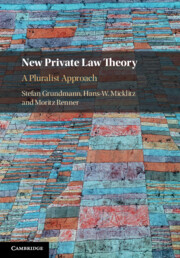Book contents
- New Private Law Theory
- New Private Law Theory
- Copyright page
- Contents
- Preface
- New Private Law Theory
- Part I Methods and Disciplines
- Part II Social Ordering, Constitutionalism and Private Law
- Part III Transactions and Risk: Private Law and the Market
- 11 Negotiation, the Function of Contract and the ‘Justice of Consensus’
- 12 Knowledge and Information
- 13 Private Power
- 14 Non-discrimination
- 15 Risk, Tort and Liability
- 16 Digital Architecture of Private Law Relations
- 17 Between Market and Hierarchy
- Part IV Persons and Organizations
- Part V Private Law (Rule-Setting) beyond the State
- Index
- References
12 - Knowledge and Information
from Part III - Transactions and Risk: Private Law and the Market
Published online by Cambridge University Press: 09 April 2021
- New Private Law Theory
- New Private Law Theory
- Copyright page
- Contents
- Preface
- New Private Law Theory
- Part I Methods and Disciplines
- Part II Social Ordering, Constitutionalism and Private Law
- Part III Transactions and Risk: Private Law and the Market
- 11 Negotiation, the Function of Contract and the ‘Justice of Consensus’
- 12 Knowledge and Information
- 13 Private Power
- 14 Non-discrimination
- 15 Risk, Tort and Liability
- 16 Digital Architecture of Private Law Relations
- 17 Between Market and Hierarchy
- Part IV Persons and Organizations
- Part V Private Law (Rule-Setting) beyond the State
- Index
- References
Summary
Information is a valuable resource: Knowledge is power. And yet it occupies a slum dwelling in the town of economics.’ So begins George Stigler’s article early in the 1960s, often considered to be the start of information economics, written one year after his Chicago colleague Ronald Coase published his seminal paper on ‘Social Cost’, often seen as the start of transaction cost and institutional economics. Contemporaneous legal scholarship had a similar blind spot regarding information as an asset; that is, at least until the last three decades of the twentieth century, during which it came to dominate regulation theory in private law. Throughout the preceding decades, competition issues had been the central occupation of economic theory, and practices that would restrict competition the core target of market regulation.
- Type
- Chapter
- Information
- New Private Law TheoryA Pluralist Approach, pp. 230 - 247Publisher: Cambridge University PressPrint publication year: 2021

